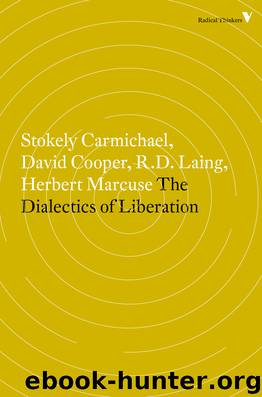The Dialectics of Liberation by David Cooper

Author:David Cooper
Language: eng
Format: epub
Publisher: Verso Books
Published: 2015-06-09T04:00:00+00:00
Objective Values | Paul Goodman
Scientists, like other people, tend to notice what they are interested in. The hypothesis determines the experiment and what is salient has weight as evidence. But there is a problem special to the social sciences. The experimental part of social sciences is social action, finally political action; and when you engage in political action you have to get other people to co-operate with you. So what you notice, depending how you are in the world, must impose itself on the others and finally you must make them be, or see that they are, in the world in the same way.
Many of us are so extremely dissatisfied with the state of society that we want to change it structurally, make a revolution. But what we most want to change, and the lever that seems promising in order to make a change, is likely to differ from group to group, as each group is in the world. I trust that this is merely a commonsense remark. But my experience at this conference has been that when people disagree with me, one method they use to ignore me is to say, ‘Oh that’s just common sense.’ And they then don’t pay any attention to it and proceed as if it were not the case.
Let me discuss briefly three revolutionary crises as they appear to different groups. Start with one that is undebatable. There is a high risk that the world will be destroyed by nuclear war within the next ten or fifteen years, and everybody agrees that total destruction is a Bad Thing. Now if one has been, like myself, a pacifist for forty years, one is terribly impressed that during that period, since the First World War, the potentiality for destruction has been increasing at a rapid rate and has now reached catastrophic proportions. It follows quite simply from this that in the world at present the real We and They is the people of the world against the power structure of the world: the power is the enemy, whatever its politics or ideology. I don’t mean necessarily that the different powerful nations are equally culpable politically or morally; but they are as powerful as they are because they think in certain terms. They have invested their capital and their brains along a certain line; for twenty years they have been stockpiling nuclear weapons or making desperate attempts to get them. Necessarily this kind of thinking becomes the rationality of their societies.
We can assume, I think, that no decision-maker plans for the bust-up, yet there is an almost inevitable drift towards that bust-up. And we can easily imagine circumstances that would produce it. Consider my own country. Suppose there is a continuing rash of very bad riots on the streets, and as a result an extreme reactionary group is swept into power. Then suppose that one of the big South American countries, Brazil or Chile, goes Castroite – as could happen at any time. It is almost inevitable that, in a panic, nuclear bombs would be dropped.
Download
This site does not store any files on its server. We only index and link to content provided by other sites. Please contact the content providers to delete copyright contents if any and email us, we'll remove relevant links or contents immediately.
| Anthropology | Archaeology |
| Philosophy | Politics & Government |
| Social Sciences | Sociology |
| Women's Studies |
Cecilia; Or, Memoirs of an Heiress — Volume 1 by Fanny Burney(32538)
Cecilia; Or, Memoirs of an Heiress — Volume 2 by Fanny Burney(31935)
Cecilia; Or, Memoirs of an Heiress — Volume 3 by Fanny Burney(31925)
The Great Music City by Andrea Baker(31911)
We're Going to Need More Wine by Gabrielle Union(19032)
All the Missing Girls by Megan Miranda(15927)
Pimp by Iceberg Slim(14476)
Bombshells: Glamour Girls of a Lifetime by Sullivan Steve(14046)
For the Love of Europe by Rick Steves(13872)
Talking to Strangers by Malcolm Gladwell(13341)
Norse Mythology by Gaiman Neil(13332)
Fifty Shades Freed by E L James(13228)
Mindhunter: Inside the FBI's Elite Serial Crime Unit by John E. Douglas & Mark Olshaker(9313)
Crazy Rich Asians by Kevin Kwan(9271)
The Lost Art of Listening by Michael P. Nichols(7487)
Enlightenment Now: The Case for Reason, Science, Humanism, and Progress by Steven Pinker(7303)
The Four Agreements by Don Miguel Ruiz(6739)
Bad Blood by John Carreyrou(6610)
Weapons of Math Destruction by Cathy O'Neil(6261)
